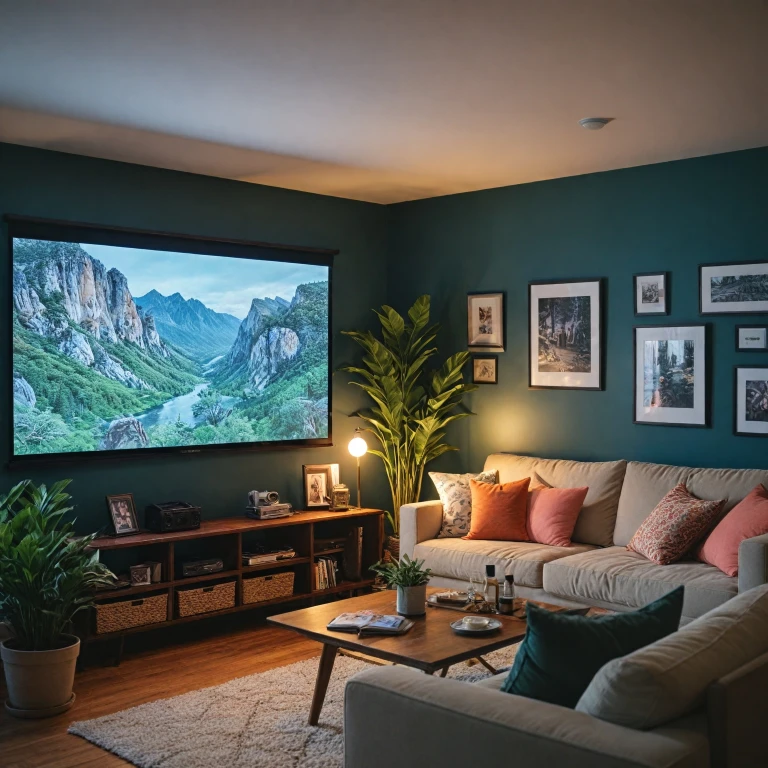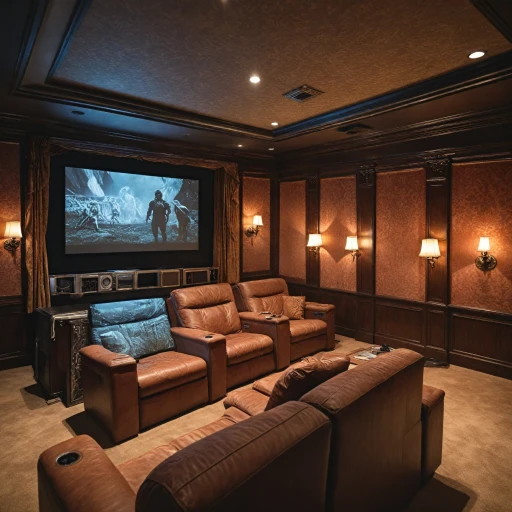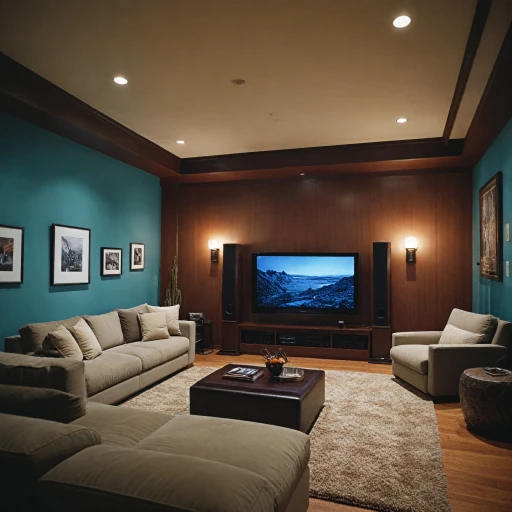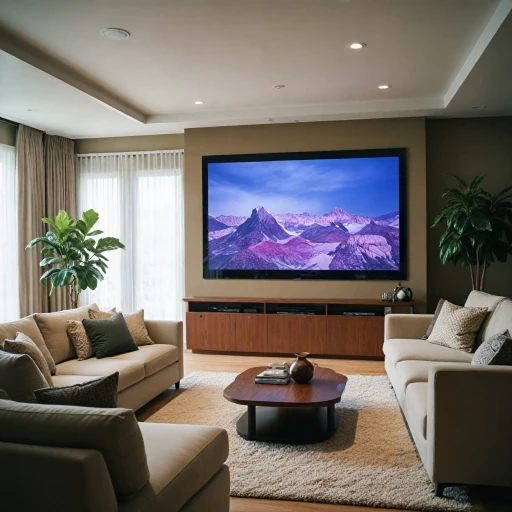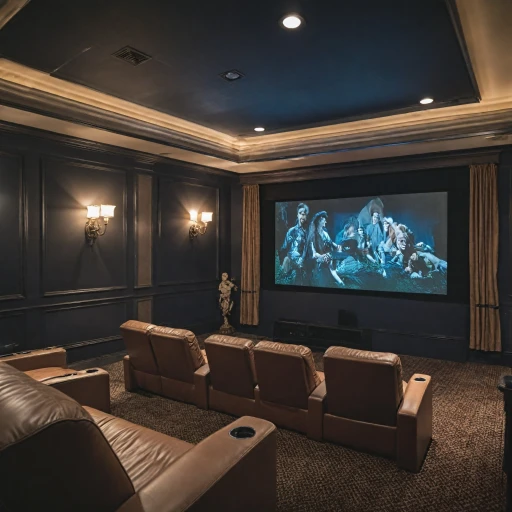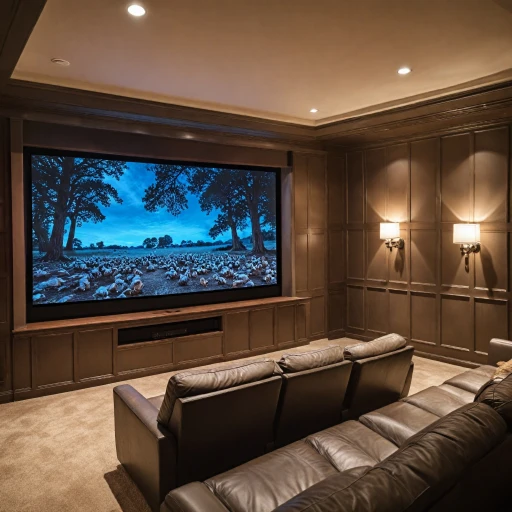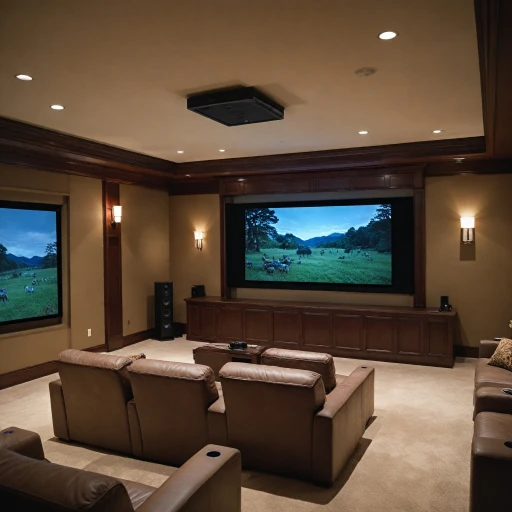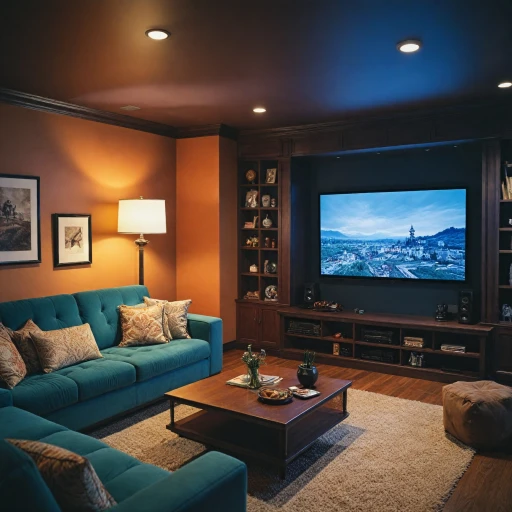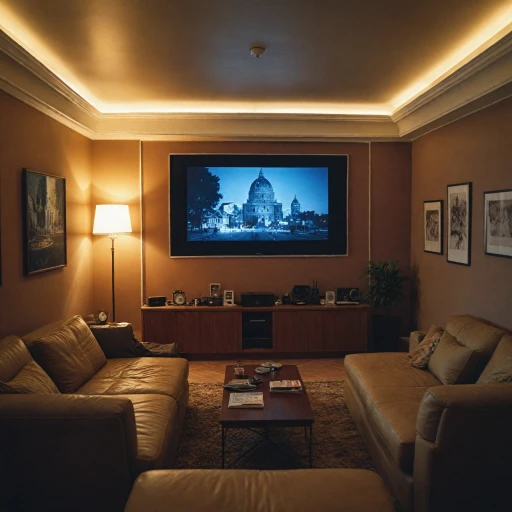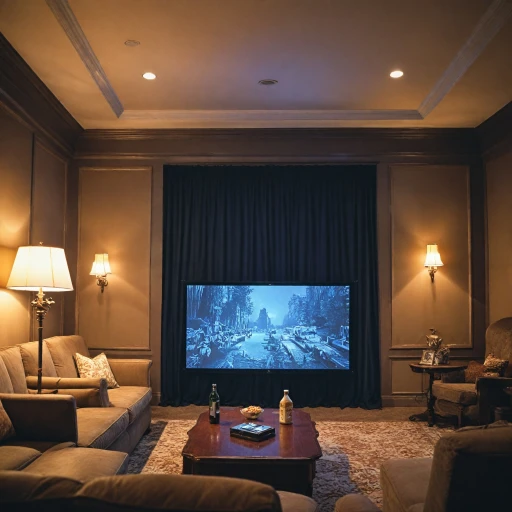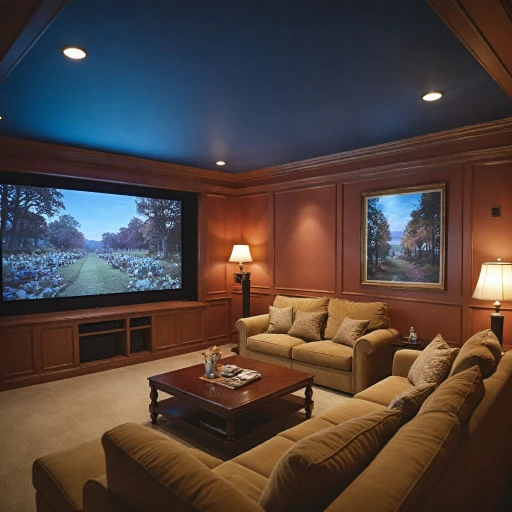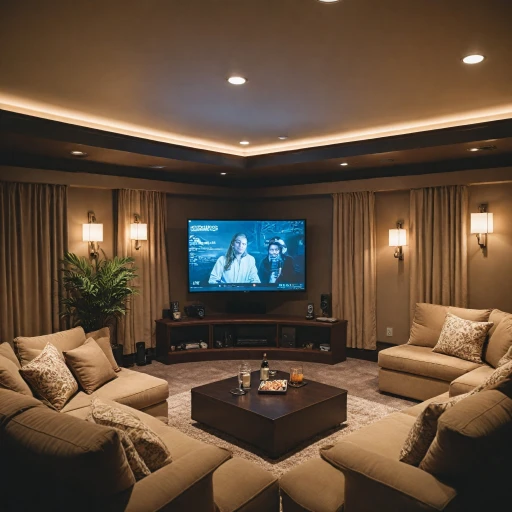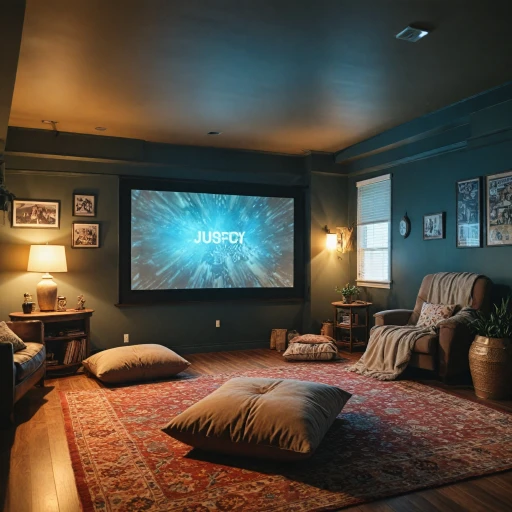
Understanding HDMI Projectors
The Basics of HDMI Projectors
HDMI projectors have become increasingly popular for home theaters, offering high-definition video and audio transfer with a single cable. These devices connect seamlessly to a wide range of media sources, from DVD players to gaming consoles, delivering an immersive experience akin to a cinema.
One defining aspect of HDMI projectors is their variety, ranging from portable mini projectors to professional-grade models like the horizon pro. Each type comes with unique features, such as different levels of brightness, resolution, and connectivity options. It’s important to consider what fits best for your home setting and planned use. For instance, having a short throw projector allows you to project a large image even from a short distance, ideal for limited spaces.
When looking to set up a home theater, an HDMI projector with a built-in bluetooth functionality can be a compelling option as it enables wireless audio streaming. Moreover, several models offer screen mirroring capabilities, allowing you to display content from smartphones or tablets directly.
For those looking to enjoy outdoor movie nights, a portable projector with a big screen capability could be the best choice. These devices often support wifi bluetooth connectivity and USB ports, making them versatile for multiple environments.
Investing in an HDMI projector provides substantial value, but understanding its core functions and specifications is crucial before making a purchase. To delve deeper into how HDMI connectors affect projector quality, visit our comprehensive guide on HDMI connector impact.
Key Features to Consider
Important Characteristics and Specifications
When considering purchasing an HDMI projector for your home theater, there are several key features that can influence your decision. Delving into these characteristics will help ensure a fulfilling viewing experience that meets your specific needs.
Resolution Choices for Crisp Visuals
Resolution is critical when selecting a projector since it directly impacts picture clarity. Most devices come in resolutions ranging from 720p to 4K. If you’re aiming for an immersive theater experience with vibrant detail, a 4K projector could be the best choice. Additionally, high aspect ratio compatibility is a must for wide screen movies.
Brightness and Contrast Ratio
Brightness is measured in lumens, which indicates how well a projector handles ambient light. For a dimly lit room, lower lumen projectors may suffice, whereas, for outdoor viewings, higher lumen ratings are advisable. A good contrast ratio also contributes to better picture quality by offering deeper blacks and brighter whites.
Connectivity Options
Modern projectors offer various ways to access media content. An HDMI port is essential for connected devices like Blu-ray players or gaming consoles. For wireless solutions, consider projectors with integrated WiFi Bluetooth functionality. If portability is key, look for mini projectors that offer USB and Bluetooth capabilities to connect to portable devices effortlessly.
Sound Quality Enhancements
While the video is paramount, audio should not be overlooked. Some projectors come with built-in speakers, which might be adequate for small rooms. However, for a larger setup, pairing the projector with an external audio system is recommended. Check for audio output ports if audio expansion is a priority.
Portability and Design
Portable projectors are gaining popularity due to their convenience and ease of use. If you wish to move your projector between rooms or even outdoors, look into compact designs such as mini projectors with short throw features. Consider the weight and ease of setting up these devices, especially if you're interested in a mogo pro or horizon pro model.
Cost Considerations
Lastly, price plays a crucial role in your decision. Define a budget and compare specs and features within that range to find the best deals. Platforms like Amazon often have competitive prices and reviews to help guide your decision.
For a deeper dive into available HDMI projector options and advice on selecting the best one based on your requirements, you should click here for a comprehensive guide on top HDMI modulators.
Setting Up Your Home Theater
Creating the Perfect Setup for Optimal Viewing
Setting up your home theater with a projector requires careful planning to ensure you achieve the best viewing experience. Whether you're utilizing a portable projector for versatile placement or a high-end laser projector for impressive image quality, some essential considerations will enhance your setup.- Positioning the Projector: Choose a location that avoids direct light interference, ensuring that your projector is positioned to cast a clear, unobstructed image. Consider a ceiling-mounted projector to save space and maintain room aesthetics.
- Selecting the Right Screen: The choice of screen type can significantly impact your viewing experience. For an outdoor setup, a portable screen that supports easy assembly and durability is ideal. Indoors, selecting a projector screen suitable for the aspect ratio and size of your room is crucial for avoiding distortion.
- Cabling and Connectivity: Ensure you have an HDMI cable of appropriate length to connect your devices effectively. Most modern projectors offer multiple ports such as HDMI, USB, and even projector Bluetooth connectivity. Verify that the devices you wish to connect, like your video or audio sources, are supported by your projector’s available inputs.
- Audio Considerations: Integrating a sound system that complements your visual setup is vital. Consider using additional speakers or a soundbar to enhance audio output, ensuring it matches the quality of your visuals.
- Adjusting Settings: It is necessary to adjust the settings like brightness, contrast, and keystone to fine-tune the image quality according to your environment. Mogo Pro and Horizon Pro projectors offer advanced settings for tailor-made customization.
Comparing HDMI Projectors
Evaluating Different Projector Models
When it comes to choosing the best projector for your home theater, understanding the differences between various models is crucial. This comparison aims to shed light on the most important aspects to consider for an optimal viewing experience. Whether you're seeking a portable option for outdoor movie nights or a full-featured pro projector for your theater room, each type has distinct benefits.
For a more intimate setup, mini projectors offer portability and convenience, ideal for on-the-go entertainment or small spaces. Look for features like Bluetooth connectivity and USB ports, allowing you to easily connect your devices. Popular models, like the mogo pro and horizon pro, combine portability with impressive screen mirroring capabilities and have received positive reviews for their image quality and ease of use.
Short throw and ultra short throw projectors are perfect for those who don’t have much room but still want a big screen experience. These projectors can produce large images from minimal distances, minimizing the impact of room size on your viewing experience. When comparing prices, be mindful of the trade-off between image size, clarity, and budget.
For those seeking cutting-edge technology, laser projectors offer high brightness levels, great color accuracy, and longer lifespan with low maintenance. They are usually on the higher end of the price spectrum but often provide the best visual experience, worthy of consideration for serious cinephiles.
Whether all-encompassing pro models or versatile portable projectors, make sure the model you select supports the HDMI and Bluetooth features essential for your needs. Reliable HDMI ports are crucial for connecting various video devices, and options like HDMI ports in home theater projectors facilitate excellent video and audio quality.
Don’t forget to check the latest deals on platforms like Amazon for the best deals and sales. Balancing between feature sets and budget will guide you to select the best model for enhancing your home theater experience.
Troubleshooting Common Issues
Addressing Common Projector Challenges
When setting up your home theater with an HDMI projector, you might encounter a few common issues. Understanding these can help you maintain the best viewing experience. Here are some typical problems and their solutions:
- No Signal Detected: Ensure your HDMI cable is securely connected to both the projector and the source device. Sometimes, the issue might be with the cable itself, so trying a different one can help. Also, verify that the correct HDMI port is selected on your projector.
- Image Quality Issues: If the image appears blurry or distorted, check the projector's focus and the distance from the screen. Adjust the aspect ratio settings to match your screen size. For portable projectors, ensure they are placed on a stable surface.
- Audio Problems: If there's no sound, confirm that the audio output settings on your source device are correctly configured. Some projectors require a separate audio cable or connection to external speakers for optimal sound quality.
- Overheating: Projectors, especially portable ones, can overheat if used for extended periods. Ensure adequate ventilation and avoid blocking the air vents. Regularly clean the filters to prevent dust buildup.
- Connectivity Issues: For projectors with Bluetooth or WiFi capabilities, ensure that the devices are within range and properly paired. Restarting the projector and the connected devices can often resolve connectivity problems.
By addressing these common issues, you can enhance your home theater experience and enjoy a seamless viewing session on your big screen. Remember, regular maintenance and using the right accessories, like a quality HDMI cable, can make a significant difference.

